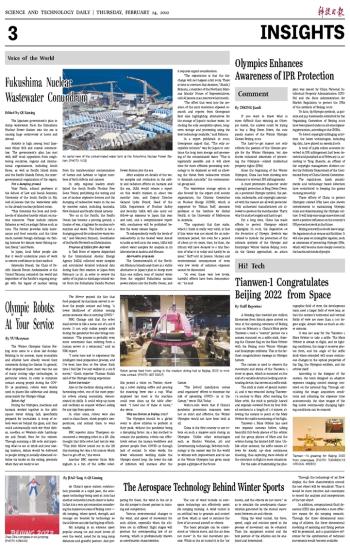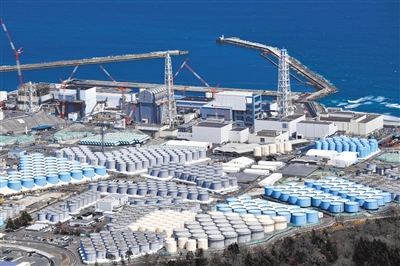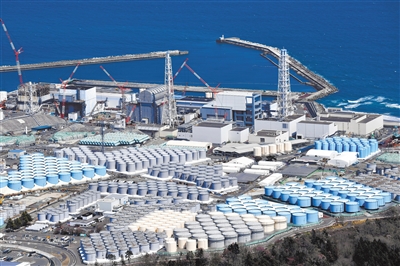
 |
 |
| An aerial view of the contaminated water tank at the Fukushima Nuclear Power Station. (PHOTO: VCG) |
The Japanese government's plan to dump wastewater from the Fukushima Nuclear Power Station into the sea is causing huge controversy at home and abroad.
Anxiety is high among local Japanese fisher folk and coastal communities. The government's plan has met with stiff vocal opposition from neighboring countries, regions and international organizations, including South Korea, as well as Pacific Island states and the Pacific Islands Forum, the intergovernmental organization of the region.
Not a dumping ground
Vijay Naidu, adjunct professor at the School of Law and Social Sciences, University of the South Pacific in Fiji, told Al Jazeera that the wastewater adds to the already nuclear polluted ocean.
"This threatens the lives and livelihoods of islanders heavily reliant on marine resources. These include inshore fisheries as well as pelagic fishes such as tuna. The former provides daily sustenance and food security, and the latter much needed foreign exchange via fishing licences for distant water fishing nation fleets," said Naidu.
In Japan, local fisher people also fear it would undermine years of work to restore confidence in their seafood.
Satyendra Prasad, the Chair of Pacific Islands Forum Ambassadors at the United Nations, reminded the world last September of the Pacific's ongoing struggle with the legacy of nuclear testing from the transboundary contamination of homes and habitats to higher numbers of birth defects and cancers.
In 1985, regional leaders established the South Pacific Nuclear Free Zone Treaty, prohibiting the testing and use of nuclear explosive devices and the dumping of radioactive waste in the sea by member states, including Australia, New Zealand and Pacific Island nations.
"For us in the Pacific, the Pacific Ocean has become a proving ground, a theatre of war, a highway for nuclear submarines and waste. The Pacific is not a dumping ground for radioactive waste water," said Maureen Penjueli, Coordinator of the Pacific Network on Globalization.
Progress of IAEA's five-day visit
A Task Force of experts dispatched by the International Atomic Energy Agency (IAEA) collected water samples and scrutinized detailed technical data during their first mission to Japan from February 14-18, in order to review the safety of its plan to discharge treated water from the Fukushima Daiichi Nuclear Power Station into the sea.
After analysis on details of the water samples and evaluation in the safety and radiation effects on humans and the sea, IAEA would release a report on this week's mission in about two months' time, said Deputy Director General Lydie Evrard, Head of the IAEA Department of Nuclear Safety and Security. IAEA will also carry out follow-up missions to Japan this year and next, and a comprehensive report with conclusions will be published before the water release begins.
To independently verify the levels of radioactivity in the treated water stored in tanks as well as in the ocean, IAEA will collect water samples for analysis in its laboratories in Austria and Monaco.
Alternative proposals
The Commonwealth of the Northern Mariana Islands says there is a viable alternative to Japan's plan to dump more than one million tons of treated water from the crippled Fukushima nuclear power station into the Pacific Ocean, and it requires urgent consideration.
"The expectation is that the discharge will not happen until 2023. There is time to overturn this decision," Sheila J Babauta, a member of the Northern Mariana Islands' House of Representatives, told Al Jazeera in an interview last month.
"The effort that went into the creation of the joint resolution exposed research and reports from Greenpeace East Asia highlighting alternatives for the storage of Japan's nuclear waste, including the only acceptable option, long-term storage and processing using the best technology available," said Babauta.
In a report published in 2020, Greenpeace argued that, "The only acceptable solution" was for Japan to continue the long term storage and processing of the contaminated water. "This is logistically possible and it will allow time for more efficient processing technology to be deployed as well as allowing the threat from radioactive tritium to diminish naturally," the environmental group said.
The wastewater storage option is also favored by the expert civil society organization, the Citizens Committee on Nuclear Energy (CCNE), which is supported by Tilman Ruff, associate professor at the Institute for Global Health at the University of Melbourne in Australia.
"The argument that they make, which I think is really very valid, is that if this water was not stored for an indeterminate period, but even for a period of about 50-60 years, then, by then, the tritium will have decayed to a tiny fraction of what it is today and hardly be an issue," Ruff told Al Jazeera. Human and environmental consequences of even very low levels of radiation exposure cannot be discounted.
"At even those very low levels, harmful effects have been demonstrated, " he said.


 Next
Next




